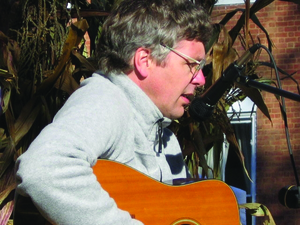

Ted Olson
Ted Olson began studying Appalachian folk arts and playing folk music when he was a teenager and started writing poetry and prose at an even younger age.
“For me, it was a way to confront the chaos, the socioeconomic inequalities and political corruption, I observed while growing up in Washington, D.C., in the late 1960s and early 1970s. The idealistic generation before me could find psychic grounding through the urban folk music revival of the late 1950s and early 1960s, but without access to a unifying social movement I constructed my own folk revival, writing poetry about the world around me and learning and performing folk songs, ballads and tunes for anyone who would listen. And feeling compelled to learn more about those artistic traditions, I moved to where many of the folk arts I studied originated: Appalachia,†Olson says.
Olson has served the arts in a number of capacities throughout his 40-year career, most of which was spent in Appalachia. He has demonstrated Appalachian folk arts to children and adults. He has interpreted American culture for international students in Appalachia and abroad. He taught a wide range of Appalachian studies courses to college students and the general public.
For more than 25 years, Olson performed Appalachian, British and Irish folk songs and ballads at a wide variety of venues. He accompanies himself on guitar, banjo and dulcimer, and uses the opportunity to introduce the historical context for each song/ballad.
He has performed at folk festivals, restaurants and educational events among other venues. He has opened for, or has played in the same concert series as, a number of well-known musicians and storytellers, including Mary Chapin Carpenter, Steve Young, Southern Culture on the Skids, Donald Davis, Waddie Mitchell, Michael Martin Murphy, Steve Forbert, Sparky Rucker and Jean Redpath.
Currently, Olson is a professor in the Department of Appalachian Studies at East Tennessee State University, Johnson City, Tennessee. He has made significant contributions to Appalachian culture as a musician, folklorist, journalist, music producer, editor, ethnomusicologist and poet.
“I was the first person to fully document the three influential 1920s-era location recording sessions in East Tennessee: the Bristol Sessions of 1927-1928, the Johnson City Sessions of 1928-1929, and the Knoxville Sessions of 1929-1930.
“I edited the collected poetry and short stories of acclaimed Appalachian author James Still, and collections of literary works by Sherwood Anderson and Sarah Orne Jewett.â€
For his work as a music historian, he has received seven Grammy Award nominations, an Independent Music Award, two Jack Spadaro Documentary Awards and two Association for Recorded Sound Collections Awards for Excellence.
Olson also created “Portrait of an American Singer,†a compilation of Tennessee Ernie Ford’s early recordings.
In addition to the three Sessions and Ford compilations, he produced and compiled four albums for the Great Smoky Mountains Association, “Old-Time Smoky Mountain Music;†“Old-Time Bluegrass from the Great Smoky Mountains;†“On Top of Old Smoky: New Old-Time Smoky Mountain Music†and “Big Bend Killing: The Appalachian Ballad Tradition.â€
He has written album notes for various CDs of American vernacular music released by such record companies as Rounder Records, Craft Recordings, Rhino Records, Archeophone Records, Lonesome Records, The Crooked Road: Virginia’s Heritage Music Trail and the Ralph Stanley Museum and Traditional Mountain Music Center.
For his work as a music historian, Olson has received the International Bluegrass Music Association’s Best Liner Notes for a Recorded Project Award; the Independent Music Awards’ Best Tribute Album Award; the Alliance for Public Lands’ Most Innovative Product Award; the Regional Excellence in History Award of Distinction from the East Tennessee Historical Society; and seven Grammy Award nominations.
He is currently working on compiling and curating several documentary albums of Appalachian music and writing poems toward his third poetry collection.
He says he writes poetry “not principally to share with anyone else in particular but for my own purposes, to better understand the meaning of existence as well as to explore the human interrelationship with the natural world.â€
Acclaimed as one of the Appalachian region’s finest poets, Olson is the author of “Breathing in Darkness: Poems†(2006) and “Revelations: Poems†(2012). He has also written several studies of regional culture, including Blue Ridge Folklife (1998), and he co-authored the influential book “The Bristol Sessions: Writings About the Big Bang of Country Music†(2005).
Olson received his Bachelor of Arts in English from the University of Minnesota, Master of Arts in English from the University of Kentucky, and Doctorate in English from the University of Mississippi.
He served as editor of the Journal of Appalachian Studies, music reviewer for the Oxford American, poetry editor for Rapid River Magazine, founding editor of CrossRoads: A Journal of Southern Culture, and music section editor and associate editor for The Encyclopedia of Appalachia.
Olson has served as president of the Tennessee Folklore Society and as book series editor for the University of Tennessee Press’s Charles K. Wolfe Music Series.
“The arts are central to understanding who we were as a culture and society; who we are, individually and collectively; and who we will be, who we want to be. The arts are a mirror that can (if we choose to look) reflect the best of humanity’s past and present. Since young people are our future, it is essential to introduce to them a generous share of arts-based experiences, as the arts can inspire young people to live lives that are at the same time more deeply rooted and less bound to things that hold them back.
“After moving to the Tri-Cities in 1999, I noted that some regional narratives were well developed while other stories yearned to be told. I have tried to add my voice in telling stories of both the former and the latter types. The honor of receiving this award suggests that my voice has been heard, and for that I am most grateful,†Olson said.
READ ON: Eugene Wolf’s passions are music and theater